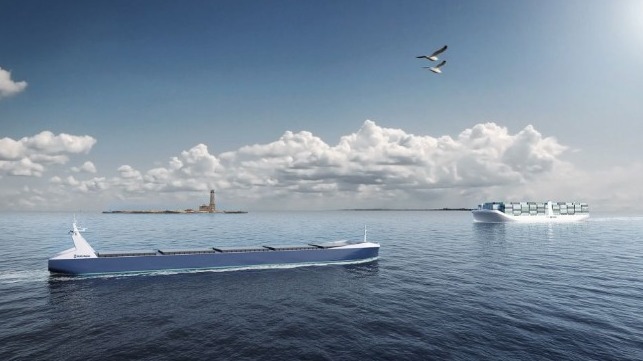New Network Supports Port Readiness for Autonomous Shipping

Eight of the leading maritime nations are coming together to form a new network to encourage the development of Maritime Autonomous Surface Ships (MASS). Called MASSPorts, the network will address the challenges of making ports ready for autonomous shipping.
Representing the flag, coastal and port authorities from China, Denmark, Finland, Japan, the Netherlands, Norway, Republic of Korea, and Singapore, the network met virtually to outline the objects of the initiative. They were also joined by representatives from the International Maritime Organization (IMO), International Association of Marine Aids to Navigation and Lighthouse Authorities (IALA), as well as International Association of Ports and Harbors (IAPH).
“Autonomous navigation is an important part of our plans to be a future-ready port. We see MASS having the potential to enhance navigational safety and increase productivity,” said Quah Ley Hoon, Chief Executive of the Maritime and Port Authority of Singapore. Similar views were expressed by the representatives from China who also pointed to the integration of shipping into the global supply chain.
Believing that vessels and ports must be equipped with infrastructure that has common terminology, form, and standards for seamless operation, the network outlined goals that are designed to address the challenges and achieve alignment of standards for the trials and operation of Maritime Autonomous Surface Ships (MASS) in ports.
They will seek to develop detailed guidelines and conditions for MASS trials in ports, including agreeing on the conditions for MASS trials and working within the IMO’s interim guidelines for MASS trials.
“We are aware of the fact that conventional shipping will remain a reality in our port but we are also convinced that smart ships and even autonomous ships will be visiting Rotterdam as well. Smart ships need smart ports. Innovative co-operation between ports, the industry and shipping is key,” said René de Vries, State Harbourmaster of Port of Rotterdam Authority.
Recognizing that the international transit of vessels involves calls at different ports where vessels interact with many stakeholders and systems, the network also set a basic objective of establishing common terminology, forms and standards of communication, ship reporting and data exchange to enhance inter-operability of systems across different ports.
Additionally, the network will work to facilitate port-to-port MASS trials. The representatives agreed that the trials should emulate the international nature of shipping with the objective of validating the proposed guidelines and conditions for MASS trials, and the inter-operability of port-based systems. This will allow the network to identify and address additional challenges to operating MASS at various ports.
“Autonomous technologies are without doubt part of the maritime future and we need to pave the way for the safe and efficient use of these new systems. Cooperation is key to this, and I welcome the MASSPorts Network as a forum for the important international collaboration in this area,” commented Andreas Nordseth, Director-General of the Danish Maritime Authority. His colleagues from Finland agreed explaining that they believed that the experiences and lessons learned through the network would help to support practical advocacy work as the technology advances.
The network also hopes to benefit from the experience being developed by the participating countries. For example, Japan noted that it has accelerated the development of autonomous technology seeking to reduce the workloads on seafarers and the risks of accidents as well as improve the efficiency of shipping operations. At present, through R&D and trials, Japan is focusing on three types of autonomous technologies: autonomous navigation/collision avoidance, remote control navigation, and automated berthing.

that matters most
Get the latest maritime news delivered to your inbox daily.
Similarly, the Norwegian Maritime Authority and the Norwegian Coastal Administration which are participating in the network have together played a key role in the establishment of three test areas for autonomous solutions in Norwegian waters and the establishment of the Norwegian Forum for Autonomous Ships. The Norwegian Maritime Authority also highlighted its efforts as the first administration to deliver clear guidelines on accepting autonomous ships in national, commercial operations.
The Republic of Korea has committed to investing approximately $130 million between 2020 and 2025 to develop autonomous navigation systems for MASS and applying it to actual vessels. In addition, Korea has been working to establish a smart marine logistics infrastructure and services such as smart ports and hyper-connected maritime communication in line with the development and commercialization of MASS.
